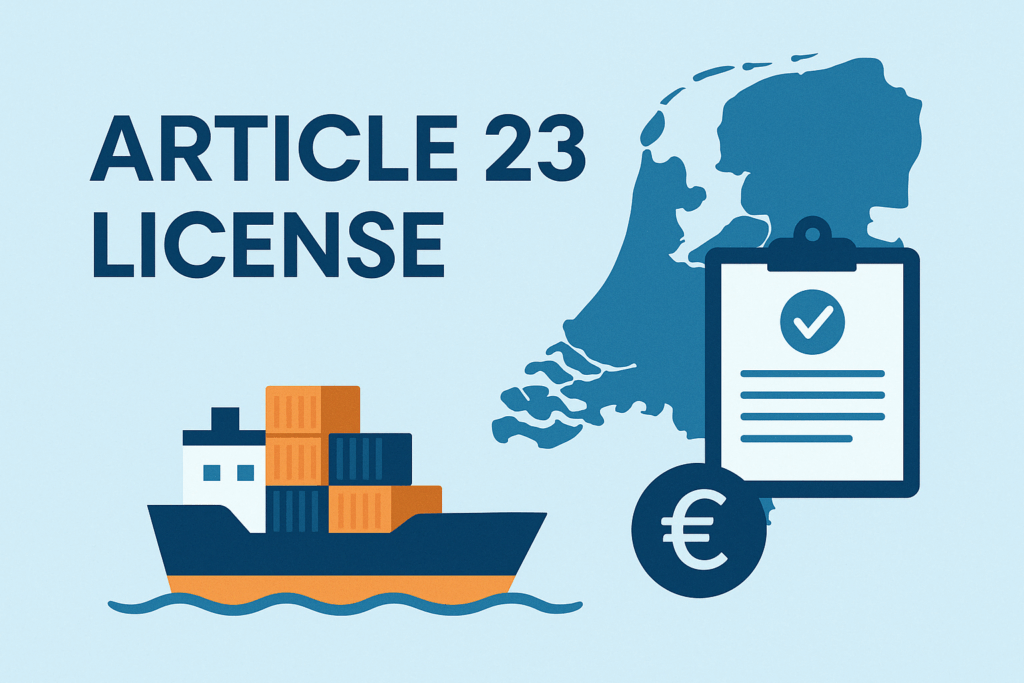VAT in the Netherlands: Register, File & Stay Compliant
VAT in the Netherlands: A Practical Guide for International Businesses
Expanding into the Dutch market means getting familiar with VAT in the Netherlands — a system known for its efficiency but also for its strict compliance standards. Every company that sells goods or services subject to Dutch VAT must register, file periodic returns, and communicate with the Belastingdienst (Dutch Tax Authorities).
If you’re new to the process, this guide walks you through registration, the Article 23 import VAT licence, and what to do when you receive a “questions letter.”
1. Who must register for VAT in the Netherlands?
The Dutch VAT regime is mandatory. Any entrepreneur—Dutch or foreign—engaged in taxable activities must register. There’s no turnover threshold for exemption.
- Supplying goods or services within the Netherlands
- Importing goods through Dutch customs (eligible for Article 23 deferment)
- Holding inventory in a Dutch warehouse or fulfilment centre
- Selling to Dutch consumers through online platforms or marketplaces
Small local firms may opt for the Small Enterprise Scheme (KOR), which allows them not to charge VAT. The trade-off: they can’t reclaim VAT on expenses.
2. The VAT registration process
Applications are filed with the Belastingdienst using Form 3a (EU companies) or Form 3b (non-EU). You’ll need:
- Chamber of Commerce extract or foreign registration certificate
- Director’s ID + proof of address
- Dutch business address (if available)
- Description of activities and expected turnover
- List of clients and suppliers
Forms are in Dutch, and timelines vary. Many foreign companies appoint a local representative to ensure accurate, timely communication.
3. What to do if you receive a “vragenbrief”
After applying, you may get a vragenbrief,a letter with follow-up questions. It’s normal. The Tax Authority uses it to confirm that your business is active and legitimate.
- Reply before the deadline (usually 7–14 days) or request an extension.
- Be factual and specific, avoid generic statements.
- Demonstrate Dutch substance: administration, decision-making, or warehouse operations.
- Include supporting documents such as contracts, invoices, and website screenshots.
- Keep your answers consistent with your registration form and company details.
A precise, complete reply often determines how quickly your VAT number is issued.
4. Filing VAT returns and staying compliant
Once registered, you’ll receive a VAT ID (for example NL123456789B01) and a filing frequency—usually quarterly.
- Submit periodic VAT returns and pay any VAT due.
- File ICP listings for intra-EU transactions.
- Maintain clear records linking bookkeeping to VAT filings.
If you import goods, applying for an Article 23 licence lets you defer import VAT to your return instead of paying at customs, improving cash flow.
For cross-border B2C sales, the EU One Stop Shop (OSS) allows you to declare all EU sales under a single registration. More details: European Commission VAT portal.
5. Best practices for long-term VAT management
- Close VAT accounts monthly and reconcile them to your general ledger.
- Keep purchase invoices and proof of transport digitally stored.
- Track EU rule changes, especially distance-sales thresholds and OSS updates.
- Maintain accurate records of your Dutch presence to demonstrate substance if audited.
Conclusion: With disciplined record-keeping and professional support, VAT in the Netherlands becomes predictable and efficient instead of burdensome.

6. How Oakhill can support you
At Oakhill Financial Services, we help international companies register, communicate with the Belastingdienst, and stay compliant.
- Professional Bookkeeping Services – for VAT registration, Article 23 applications and accurate returns.
- Controlling-as-a-Service – to monitor VAT positions, build dashboards and keep reconciliations in order.
- CFO-as-a-Service – for strategic oversight and international tax planning.
Our multilingual team combines Dutch financial expertise with international insight, ensuring your filings are accurate, timely and fully compliant.
10 Expert Q&As About VAT in the Netherlands
1. Is VAT registration mandatory in the Netherlands?
Yes. VAT registration in the Netherlands is mandatory for any business that supplies taxable goods or services. There is no turnover threshold for exemption.
2. Can I register for VAT before starting to trade?
Yes. You can register for VAT before trading. Preparatory activities such as market research or setting up an office already qualify you as a taxable person.
3. How long does VAT registration take in the Netherlands?
It typically takes between two and four weeks, depending on processing times and whether the Tax Authority requests additional information.
4. What is Article 23 in the Netherlands and why is it useful?
Article 23 allows import VAT to be deferred to the VAT return instead of being paid upfront at customs. This significantly improves cash flow for importers.
5. Do non-EU companies need a fiscal representative in the Netherlands?
Yes, in most cases. A fiscal representative is required for non-EU businesses to manage VAT filings and communicate with the Belastingdienst on their behalf.
6. What is the Small Enterprise Scheme (KOR)?
The KOR is a Dutch VAT exemption for small businesses. Participants do not charge VAT but also cannot reclaim input VAT on their purchases.
7. Can companies form a VAT group in the Netherlands?
Yes. Companies under common control can form a fiscal unity for VAT purposes, allowing them to file a single consolidated VAT return.
8. What is the EU One Stop Shop (OSS)?
The OSS scheme allows EU and non-EU sellers to report all cross-border B2C sales in one EU Member State instead of registering for VAT in multiple countries.
9. What happens if I ignore the questions letter from the Tax Authority?
If you fail to respond to the vragenbrief (questions letter), your VAT registration may be delayed or rejected. Always reply promptly with complete information.
10. Why should I work with a local VAT expert like Oakhill?
Because communication with the Dutch Tax Authority is in Dutch and accuracy matters. Oakhill ensures precise filings, timely registration, and full VAT compliance.
Further reading: Dutch Tax and Customs Administration – Business Portal and European Commission – VAT Overview.
